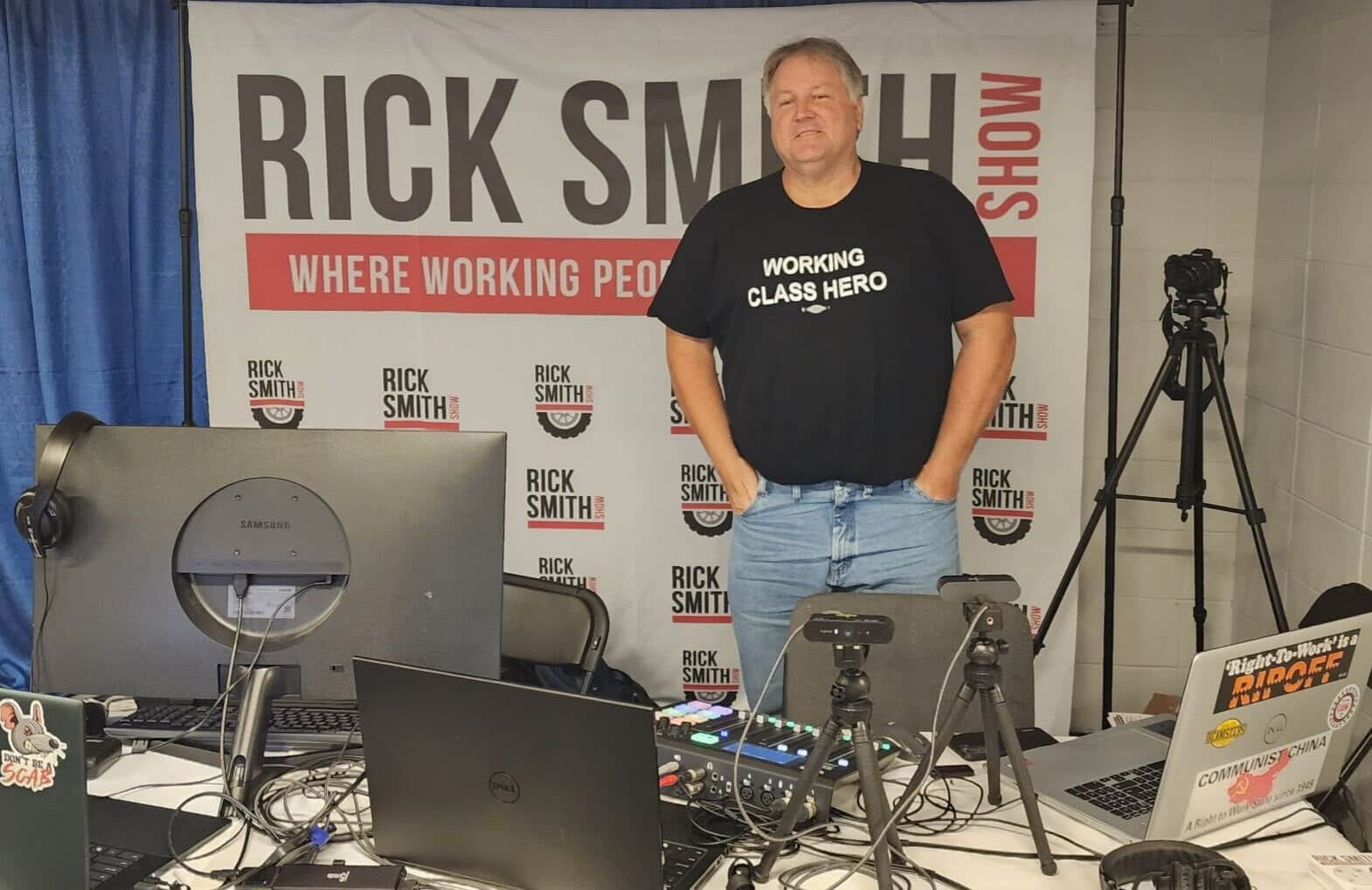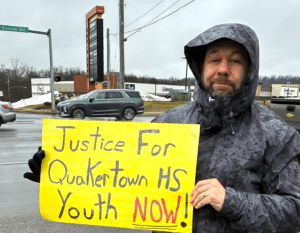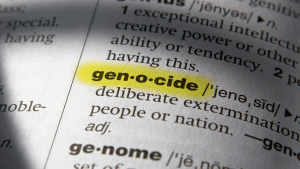When Jimmy Hoffa negotiated the National Master Freight Agreement in 1964, it was arguably the most logistically impossible labor negotiation of all time. Not just because he represented 400,000 workers, but because the average sized workforce consisted of only 25 people, necessitating that the agreement leveraged 16,000 independent employers to sign on. When they did, those companies increased wages and benefits for nearly one percent of the U.S. workforce. At the time, Pennsylvania Congressman Elmer Holland described Hoffa’s achievement, “Jimmy Hoffa has put more bread and butter on the tables for American kids than all his detractors put together.”
Years before Hoffa’s most crowning achievement, he sensed that organizing massive numbers of workers and employers would require unified political will. He believed success would come – not just through worker organizing – but by battling disinformation and ignorance. In 1959, the determined labor boss created the Democratic, Republican, Independent Voter Education (DRIVE) project. Hoffa knew that throughout history, the monied interest would spend big to silence the little guy. DRIVE focused funding on education and political action for those considered too small to be heard.
Fast forward 45 years to a political climate when teamsters, and millions of other Americans, climbed into vehicles with the radios tuned to nationally syndicated corporate shill, Rush Limbaugh. The failed sports announcer produced a steady stream of union-busting anti-worker propaganda that would make the violent Pinkerton National Detective Agency green with envy. Hellbent on division, for decades Limbaugh provided daily commentary mimicking the sentiments expressed a century earlier by railroad magnate, Jay Gould, “I could hire one half the working class to kill the other half.”
One of those teamsters – driving all day and listening to the radio – was nationally recognized radio personality and labor activist, Rick Smith. Not yet the Rick Smith, he fumed at the propaganda spilling out of his speakers.
In 2004, before Rick’s radio career and the same year Limbaugh left ESPN after making racially charged comments about a Black athlete, Rick moved to rural south-central Pennsylvania from an urban, pro-labor region. He immediately experienced culture shock.
“The first five people I met displayed in some shape or form, a confederate flag. All my buddies were Rush Limbaugh fans” said Smith. “They mimicked what he said, ‘We could make more money if we had no union.’ I was shocked. I asked them, ‘Where do you see this happening? Why aren’t you there?’”
READ: Red States Are Now Weakening Child Labor Laws While Defunding Public Schools
Feeling out of place and horrified by the reality of a re-elected Bush Cheney White House, Rick tried to get involved at the lower levels of local politics – but that didn’t work. “I had moved to a part of the country that was absolutely in Bush’s corner.” Rick found – among the Democrats and Independents – a complacency, an acceptance, that the Republicans would always win and few people had the stomach to fight. “My brand of politics was not received well.”
In spring of 2005, Rick and a couple of like-minded Democrats he’d met at the local party headquarters conspired to publicly push back. They felt the need to retake lost ground, because, “For every Rush Limbaugh there are four baby Limbaughs.” Rick and his friends knew that right-wing radio broadcasts – large and small – had seriously impacted how people treated each other, their workplace expectations and politics in general.” They decided to start a program of their own. Originally called United for Progress, they changed the name when the original announcer became ill. Rick stepped in and on Labor Day Weekend, eighteen years ago, The Rick Smith Show, went on the air.
The program, tag lined – Where Working People Come to Talk, has relentlessly filled the airwaves. Through dogged determination it has grown from a local pro-labor staple to a national broadcast phenomenon and regular producer of web-based content.
The award-winning program has only one chronic handicap – funding. Even though the foremost industry trade journal, Talkers Magazine, recognized The Rick Smith Show as one of the 100 most influential shows in the nation, the program struggles to get organized labor and other progressive groups to invest the type of cash that would propel the show forward and help Rick sleep better at night. Rick is quick to remind any reluctant investors, “I’m on the list of the 100 top talk shows, 95 of which hate you.”
Rick’s remedy for being up against such seemingly insurmountable odds? Get bigger, push back harder, never give up. “I’ve succeeded out of pure spite. We had a salesman early on who told me, ‘I’ll give you six months.’ It’s 18 years, I’ve proved him wrong thirty-six times!”
READ: Five Critical Lessons From UPS’s Union Workers
Like most talk show hosts, Rick followed convention by naming the show after himself, but he’s first to tell you he didn’t – couldn’t – do it alone. A volunteer at Big Brothers Big Sisters, Rick escorted his “little brother” on an outdoor adventure and met the woman who wouldn’t just marry him and become the mother of his children, she also become his behind-the-scenes-partner at every level of the radio show. Humbly Rick explains, “She’s the only reason I’ve been doing it so long.”
Carol says it’s all Rick, “He’s passionate about being a Teamster. He wants union density to come back to where it had been. He knows unions can fix other problems. In unions everyone’s the same. Women. Minorities. The pay and benefits are the same.”
Union activist and 3rd Executive Vice President of the National Veterans Affairs Council, Will Wetmore, sees union strength as a force for justice in the country. “Unions created the middle class. Unions are at the front of immigration, equity, equality. Diversity works and we’re better for it. The unions historically had dark moments. But now we’re the leaders working against misogyny, racism.”
Wetmore is grateful for The Rick Smith Show amplifying this story. “I’m a big fan of what Rick’s done. It would be great to have an Anti-FOX network,” he said. “If you can be heard, you can change people’s minds.” Wetmore knows that FOX knows this, and Rick’s particular brand of radio is an antidote to their rightwing propaganda.
Former five-term Republican Congressman Robert Ney – a regular, thrice weekly guest on the show, agrees. A self-described pro-labor Republican “with, ‘working persons’ interests at heart,” Ney loves Rick’s brand of idealism. “Rick’s out front on the issues. He doesn’t do programmed responses. If you don’t like something he says, that’s okay. It’s healthy for the system. The other reason I love doing his show? He’s smart. He’s one of the best people in retail politics that I’ve ever seen.” And Ney says that doesn’t just make Rick’s show valuable. It makes it entertaining.
READ: The Arch-Conservative Bradley Foundation Is Waging A War On Democracy
But 9,000 hours of programming – over 18 years – don’t just create themselves. Brett Banditelli, now a labor communicator living and working on the West Coast, was a longtime producer of Rick’s show. Banditelli sums up Rick’s devotion:
“I give him infinite credit. Fighting for eighteen years as a working-class person is monumental. Mass media is owned by the conservatives. It’ll never not be owned by them. Corporate media supports the bosses who don’t bargain in good faith. Labor needs voices out there like Rick to force a bond with every generation, especially young people. That’s the future of unions. Most jobs labor unions organized a hundred years ago don’t exist anymore.”
Without factory floors, there needs to be another way to get the word out.
Banditelli thinks the voice of Labor has to be smart and adapt quickly – like Rick. “The gains we’re witnessing under Biden, Rick’s been calling for those for years. We need campaigners and organizers for labor reform. Rick’s one of them.”
When Rick was asked what he needs to keep going, the show host listed four things. “One, funding to keep the lights on. Two, guests. When we call for an interview – people, especially labor organizers, have to say, ‘yes.’ Three, put me on stage. Invite me to speak. Get me in front of people. Four, promote the show. Share it on social media. Talk about it in the lunchroom.”
Carol agrees with Rick, but really stresses the first one: funding. Paying for the show is a constant concern. “Early on, he’d drive all night and pitch the show during the day: when he should have been sleeping. Some funders would make him come back over and over. I wrote a letter asking people to please not fund him. Let him get some sleep. Let him have his family time. I never mailed the letter, but I wanted to.” Why support him for nearly two decades, and who knows how much longer? Carol said, “This show is his legacy. He’s devoted to it.”
Carol believes in her husband. And Carol believes if people wanted a better life, a better country, better politics, they’d help Rick with his show and fund more programming like his.
Listeners can hear Rick live – at radio stations coast to coast – or tune in via his website.







